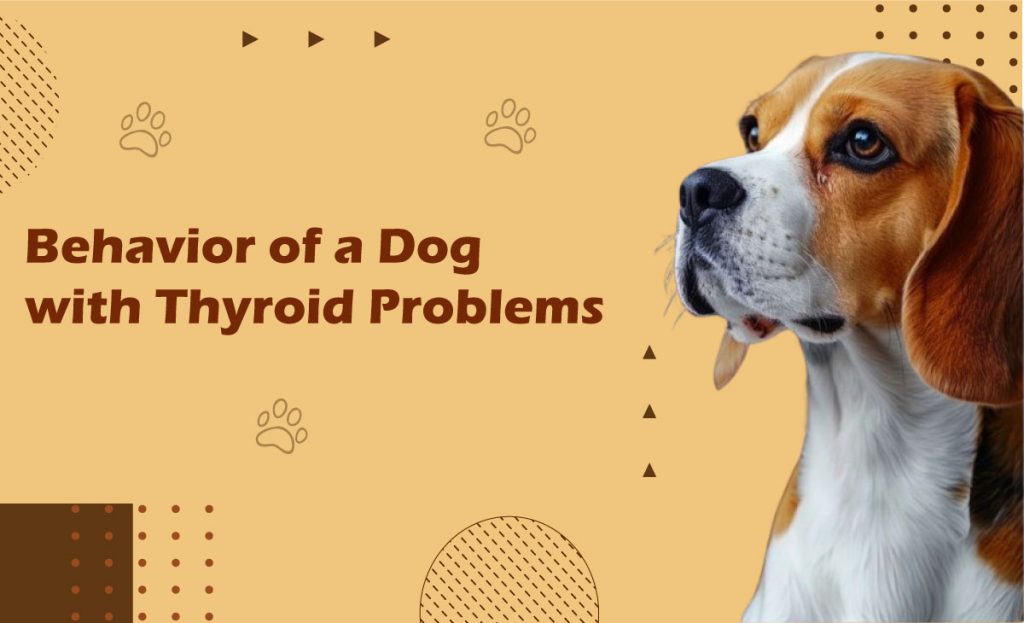Hyperthyroidism in dogs is a rare but serious condition characterized by the excessive production of thyroid hormones. These hormones regulate the body’s metabolism, so when they are produced in excess, it can lead to significant health issues.
This blog will explore the symptoms, causes, and treatment options for hyperthyroidism in dogs. We’ll also look at the dog breeds most prone to this condition, the behavior changes it can cause, and the life expectancy of dogs diagnosed with hyperthyroidism.
So, let’s get started!
What Are the Symptoms of Hyperthyroidism in Dogs?
Recognizing the symptoms of hyperthyroidism in dogs is crucial for early diagnosis and treatment. Big fluffy dogs suffering from hyperthyroidism may exhibit several signs, including:
- Weight Loss: Despite having an increased appetite, dogs with hyperthyroidism often lose weight rapidly. This occurs because the metabolism is in overdrive, burning calories faster than they can be consumed.
- Increased Thirst and Urination: A dog with hyperthyroidism may drink more water and urinate more frequently than usual. This is due to the body’s heightened metabolic state.
- Hyperactivity and Restlessness: Dogs may become unusually active or restless, often displaying nervous or anxious behavior. This hyperactivity results from the excess thyroid hormones stimulating the nervous system.
- Vomiting and Diarrhea: Gastrointestinal issues such as vomiting and diarrhea can also be symptoms of hyperthyroidism in dogs.
- Poor Coat Condition: Hyperthyroidism in dogs can affect the skin and coat, leading to a dull or thinning coat. Some dogs may also develop hyperthyroidism-related skin conditions, such as rashes or lesions.
If your big white dog is showing any of these symptoms, it’s important to consult a veterinarian as soon as possible.
What Is the Life Expectancy of a Dog with Hyperthyroidism?

The life expectancy of a dog with hyperthyroidism can vary depending on the severity of the condition and how quickly it is treated.
If left untreated, hyperthyroidism can lead to severe complications, including heart disease, kidney failure, and even death. However, your pup can easily live a healthy and normal life with the right treatment.
Treatment for hyperthyroidism in dogs often includes medication to reduce the production of thyroid hormones, dietary changes, and, in some cases, surgery to remove the thyroid gland. With these interventions, dogs can manage their symptoms and enjoy a good quality of life for many years.
What Breeds Are Prone to Hyperthyroidism in Dogs?
While hyperthyroidism in dogs is rare, certain dog breeds may be more predisposed to developing thyroid issues. These include:
- Golden Retrievers
- Beagles
- Doberman Pinschers
- Irish Setters
- Boxers
It’s important to note that while these breeds may be more prone to thyroid problems, any dog can develop hyperthyroidism. Regular veterinary check-ups and awareness of the symptoms can help ensure early detection and treatment.
What Is the Behavior of a Dog with Thyroid Problems?

Dogs with thyroid problems, including both hyperthyroidism and hypothyroidism, can exhibit a range of behavioral changes. In the case of hyperthyroidism, chunky dogs may become unusually hyperactive, nervous, or anxious.
Additionally, they might also become more irritable or aggressive due to the excess hormones affecting their mood and behavior.
On the other hand, hypothyroidism, which is more common in dogs than hyperthyroidism, often leads to lethargy, weight gain, and a decrease in activity levels.
Hence, these behavioral changes can significantly impact a dog’s overall well-being, making it important for pet owners to seek veterinary care if they notice any unusual behaviors.
Regular Veterinary Check-Ups for Hyperthyroidism in Dogs
Regular veterinary check-ups are essential for detecting and managing thyroid problems in dogs. During these visits, your vet can check for early signs of hyperthyroidism and recommend the appropriate tests and treatments.
If you’re concerned about your dog’s thyroid health, don’t hesitate to discuss your concerns with your vet or seek advice from the Hyperthyroidism in Dogs Reddit community, where pet owners share their experiences and insights.
Must Read: What is Meningitis in Dogs?
Conclusion
Hyperthyroidism in dogs, though rare, is a serious condition that requires prompt attention. By understanding the symptoms of hyperthyroidism in dogs, you can seek early diagnosis and treatment, potentially extending your dog’s life and improving their quality of life.
If you suspect your dog may be suffering from thyroid issues, consult your veterinarian immediately and explore the various treatment options available. Additionally, educating yourself about related conditions, such as hypothyroidism in dogs, can help you better care for your furry companion’s overall health.




